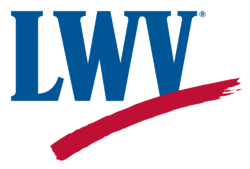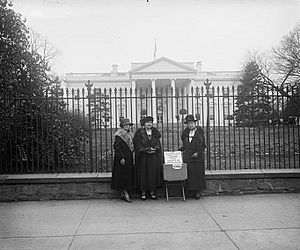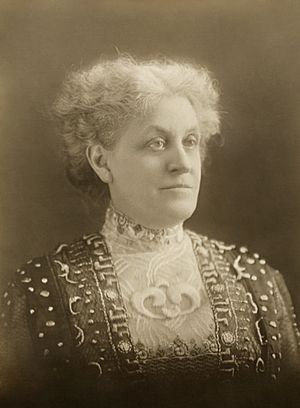League of Women Voters facts for kids
 |
|
| Motto | Empowering Voters. Defending Democracy. |
|---|---|
| Founded | February 14, 1920 |
| Founder | Carrie Chapman Catt |
| Type | Nonprofit |
| Focus | Political action, civic engagement |
| Location | |
|
Key people
|
Dr. Deborah Ann Turner (President) |
|
Revenue
|
$4,647,062 (2014) |
The League of Women Voters (LWV) is a nonprofit organization in the United States that was formed to help women take a larger role in public affairs after they won the right to vote. It was founded in 1920 to support the new women suffrage rights and was a merger of National Council of Women Voters, founded by Emma Smith DeVoe, and National American Woman Suffrage Association, led by Carrie Chapman Catt, approximately six months before the Nineteenth Amendment to the United States Constitution gave women the right to vote. The League of Women Voters began as a "mighty political experiment" aimed to help newly enfranchised women exercise their responsibilities as voters. Originally, only women could join the league; but in 1973 the charter was modified to include men. LWV operates at the local, state, and national level, with over 1,000 local and 50 state leagues, and one territory league in the U.S. Virgin Islands. The league states that it has over 500,000 members and supporters.
The League of Women Voter's primary purpose is to encourage voting by registering voters, providing voter information, and advocating for voting rights. In addition, the LWV supports a variety of progressive public policy positions, including campaign finance reform, universal health care, climate change action and environmental regulation, and gun control.
Contents
History
In 1909, Emma Smith DeVoe proposed at the National American Woman Suffrage Association (NAWSA) convention in Seattle that a separate organization be created to educate women on election processes and lobby for favorable legislation on women's issues. When her proposal was ignored, DeVoe founded the National Council of Women Voters in 1911. She recruited western suffragists and organizations to join the league.
Ten years later, prior to the 1919 Convention of the NAWSA (in St. Louis, Missouri), Carrie Chapman Catt began negotiating with DeVoe to merge her organization with a new league that would be the successor to the NAWSA. Catt was concerned that DeVoe's alignment with the more radical Alice Paul might discourage conservative women from joining the National Council of Women Voters and thus proposed the formation of a new league. As fifteen states had already ratified the 19th Amendment, the women wanted to move forward with a plan to educate women on the voting process and shepherd their participation.
Though not all members of either organization were in favor of a merger, a motion was made at the 1919 NAWSA convention to merge the two organizations into a successor, the National League of Women Voters. The merger was officially completed on January 6, 1920, though for the first year the league operated as a committee of the NAWSA. The formal organization of the League was drafted at the 1920 Convention held in Chicago.
Activities
The LWV sponsored the United States presidential debates in 1976, 1980 and 1984. On October 2, 1988, the LWV's 14 trustees voted unanimously to pull out of the debates, and on October 3 they issued a press release condemning the demands of the major candidates' campaigns. LWV President Nancy Neuman said that the debate format would "perpetrate a fraud on the American voter" and that the organization did not intend to "become an accessory to the hoodwinking of the American public." All presidential debates since 1988 have been sponsored by the Commission on Presidential Debates, a bipartisan organization run by the two major parties.
State and local leagues host candidate debates to provide candidates' positions at all levels of government.
In 2012, LWV created National Voter Registration Day, a day when volunteers work to register voters and increase participation.
The League sponsors voter's guides including Smart Voter and Voter's Edge, which was launched in collaboration with MapLight. The League, including state and local leagues, runs VOTE411.org, a bilingual website that allows voters to input their address and get candidate and election information tailored to their location.
Policy views

The League lobbied for the establishment of the United Nations, and later became one of the first groups to receive status as a nongovernmental organization with the U.N.
The League has opposed voter ID laws and supported efforts at campaign finance reform in the United States. LWV opposed the decision in Citizens United v. FEC. The League supports increased regulation of political spending. It pushed for the adoption of the National Voter Registration Act of 1993, which requires states to offer voter registration at all driver's license agencies, at social service agencies, and through the mail. The LWV endorsed passage of the Bipartisan Campaign Reform Act of 2002, which banned soft money in federal elections and made other reforms in campaign finance laws.
LWV supports the Clean Air Act, the Clean Water Act, the Safe Drinking Water Act, the Resource Conservation and Recovery Act and the Kyoto Protocol. LWV opposes the proposed Keystone Pipeline project. In January 2013, the League of Women Voters in Hawaii urged President Obama to take action on climate change under his existing authority, the Clean Air Act of 1963, which the League supported.
The League supports the abolition of the death penalty.
LWV supports universal health care and endorses both Medicaid expansion and the Affordable Care Act. It also supports a general income tax increase to finance national health care reform for the inclusion of reproductive health care in any health benefits package.
The League actively opposed welfare reform legislation proposed in the 104th Congress. It also opposes school vouchers. In 1999, LWV challenged a Florida law that allowed students to use school vouchers to attend other schools.
In May 2019, the League joined 400 other national, state, and local groups, in urging Congress to ensure passage of legislation that offers a path to citizenship to Dreamers and beneficiaries of temporary protected status and deferred enforced departure.
The League advocates gun control policies including regulating firearms and supporting licensing procedures for gun ownership by private citizens to include a waiting period for background checks, personal identity verification, gun safety education and annual license renewal.
The League supports trans rights and joined a lawsuit to protect transgender women in sports.
Governance
A national board of directors consisting of four officers, eight elected directors, and not more than eight board-appointed directors, most of whom reside in the Metro Washington D.C. area, govern the League subject to the Bylaws of the League of Women Voters of the United States. The national board is elected at the national convention and sets position policy.
Local Leagues and state Leagues are organized in order to promote the purposes of the League and to take action on local and state governmental matters. These Leagues (chapters) have their own directors and officers. The national board may withdraw recognition from any state or local League for failure to fulfill recognition requirements.
Local leagues
The League of Women Voters has state and local leagues in all 50 states, the District of Columbia, the Virgin Islands, and Hong Kong.
Notable members

- Juanita Jones Abernathy, member of the board of directors of the Atlanta Fulton County League of Women Voters
- Florence Fifer Bohrer, first female senator in the Illinois General Assembly. Served on the National League of Women Board and was the Illinois branch President.
- Inez Mee Boren, president of the Northern (California) Section
- Woodnut S. Burr, president of the Los Gatos Branch
- Becky Cain (194?–), former organization president
- Frances St John Chappelle, State president of the Nevada League of Women Voters
- Edith Chase, served as president from 1965 to 1967
- Minnie Fisher Cunningham (1882–1964), first executive secretary
- Naomi Deutsch, early member
- Nan B. Frank, very active in California League of Women Voters, president of the San Francisco Center of California League of Women Voters
- Edith Jordan Gardner, member of the Oakland Forum
- Betty Gilmore
- Ione Grogan (1891–1961), member of the Greensboro League of Women Voters
- Harriet A. Haas (1874–19??)
- Fanny M. Irvin (1854–1949), drafted a resolution to Congress which was passed by the State Legislature, endorsing Woman's Suffrage, and lobbied for the passage of the Constitutional Amendment
- Carolyn Jefferson-Jenkins, first woman of color to serve as president of the League of Women Voters
- Katharine Ludington (1869–1953), founding LWV board member, president of Connecticut LWV, head of New England region
- Jane Y. McCallum (1877–1957), women's suffrage and Prohibition activist and longest-serving Secretary of State of Texas
- Maybelle Stephens Mitchell (1872–1919), co-founder of the Georgia League
- Achsa E. Paxman (1885–1968), Utah State Legislature member, president of a State chapter
- Leonora Pujadas-McShine (1910–1995), women's rights activist, founder of Trinidad and Tobago chapter
- Edith Dolan Riley, chairman of the Spokane County Democratic Central Committee
- Margaret Zattau Roan (1905–1975), oversaw League activities in nine Southern states in 1930s
- Zelia Peet Ruebhausen (1914–1990), United Nations observer appointed 1946, member of several federal policy committees
- Orfa Jean Shontz (1876–1954), early attorney
- Virginia Kase Solomón, CEO of the League of Women Voters of the United States
- Mary Jane Spurlin (1883–1970), first woman judge in Oregon
- Helen Norton Stevens, treasurer
- F. Josephine Stevenson, State Chairman of Uniform Laws of the National League of Women Voters (1920–21).
- Ursula Batchelder Stone (1900–1985), chaired the Cook County League of Women Voters (1941 to 1944)
- Fay Webb-Gardner, First Lady of North Carolina
- Reah Whitehead, prepared the Drafts of Bills for and assisted in procuring passage of laws for Women's State Reformatory and Filiation Proceedings
- Wilhelmine Wissman Yoakum, treasurer of the California League of Women Voters
- Valeria Brinton Young
Images for kids
See also
 In Spanish: Liga de Mujeres Votantes para niños
In Spanish: Liga de Mujeres Votantes para niños






